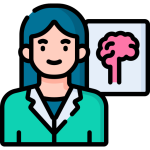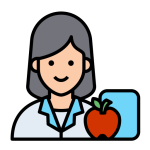Dietitians and Nutritionists
Dietitians and nutritionists are an important part of your healthcare team. They work with you on something meaningful to everyone: eating! We all have favorite foods and traditions centered on eating. Your dietitian or nutritionist is here to help balance your eating preferences with a diet that’s healthy for you.
You might be wondering what the difference is between a dietitian and a nutritionist. They both have education and training in the same areas. However, dietitians usually have additional licenses that allow them to be called a dietitian. Because of this, they often have more formal training and education requirements. If your doctor has referred you to work with someone on your diet, it will likely be a registered dietitian (RD).
Depending on your health history and medical conditions, a special diet might be recommended for you. These diets can help regulate your blood pressure, blood sugar, and cholesterol, among other things. Some common diets include low sodium, low fat and low sugar. Or, you might have a special diet that doesn’t fit exactly into a label. Either way, your dietitian can teach you what foods to eat and how much of them to eat. They can help you to know when it’s okay to have a treat and when it’s most important to cut back. They can teach you about specific foods and provide recipes that will fit in to your diet. It’s important to follow the advice your dietitian gives you. Although making changes can be difficult, your dietitian is here to help. Share your concerns and what your favorite foods are – the dietitian can help find healthier variations!
Dietitians make recommendations about what you should eat based on nutrition and your medical needs. However, you might also see a speech-language pathologist (SLP) about what food consistencies you should eat. This recommendation will be based on any swallowing difficulties you have. For instance, an SLP might recommend that you eat foods that have been pureed or drink liquids that have been thickened. Your SLP and your dietician can work together to identify foods that meet all your needs.
Explore the links below to learn more about some of the healthcare providers that may be part of your team.
Speech-Language Pathologists

Occupational and Physical Therapists

Neurologists and Cardiologists

Case Managers and Social Workers

Nurse
Practitioners

Dietitians and
Nutritionists

